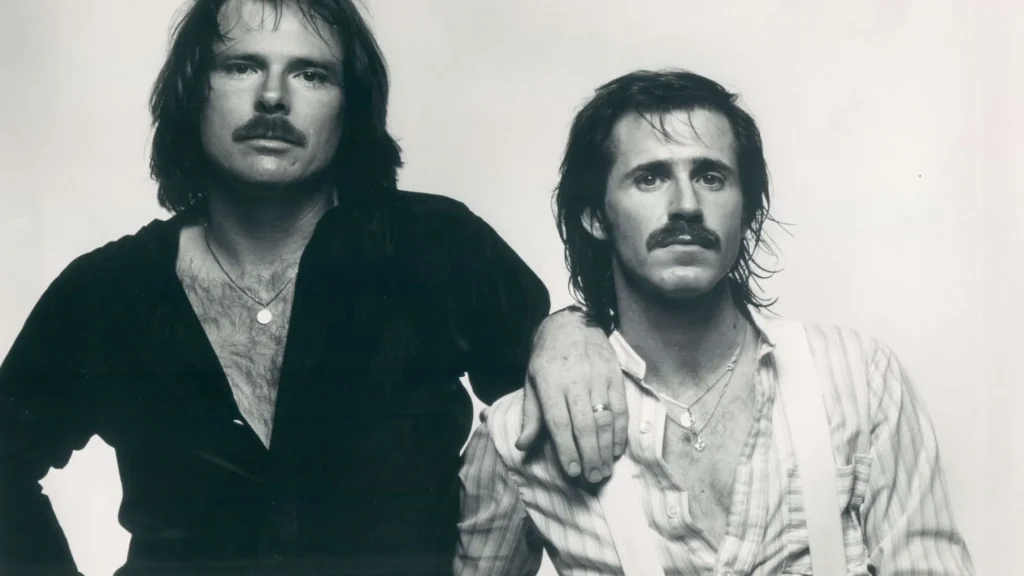
A Tender Yearning: The Longing Echoes of “I’d Really Love to See You Tonight”
In the soft glow of the late 1970s, a time when music spoke directly to the heart, England Dan & John Ford Coley emerged with their timeless classic, “I’d Really Love to See You Tonight.” Released in May 1976 as part of their album Nights Are Forever, this song quickly ascended the charts, capturing the imagination and hearts of listeners with its gentle melody and poignant lyrics. It reached an impressive peak, soaring to number 2 on the Billboard Hot 100 chart and securing the number 1 spot on the Easy Listening chart. The track’s success was not just a testament to its catchy tune but also to its profound emotional resonance.
“I’d Really Love to See You Tonight” is more than just a song; it’s a narrative woven into the fabric of countless lives. At its core, it speaks to the universal theme of longing and the simple yet profound desire for connection. The song unfolds like a tender conversation between two people who have shared something special in the past. It’s about rekindling a flame, albeit temporarily, acknowledging that sometimes life’s most meaningful moments are those that are fleeting yet deeply cherished.
The story behind this song is as compelling as its lyrics. Written by Parker McGee, it captures an authentic slice of life — the kind of everyday longing that many have felt but few have articulated so beautifully. The songwriters England Dan Seals and John Ford Coley brought McGee’s words to life with their harmonious blend of voices, creating an evocative soundscape that paints a picture of nostalgia and yearning.
The mid-1970s was an era marked by great social change and musical evolution. Amidst this backdrop, England Dan & John Ford Coley carved out a niche with their soft rock style, characterized by smooth melodies and introspective lyrics. Their music provided a soothing balm during turbulent times, offering listeners a moment of respite and reflection. “I’d Really Love to See You Tonight” epitomizes this approach — its gentle guitar strums and soft harmonies invite listeners to pause and reminisce about their own past loves and missed connections.
The magic of this song lies in its ability to evoke vivid imagery with simplicity. Lines like “I’m not talking ’bout moving in” suggest a desire for something less permanent yet intensely meaningful. It’s a sentiment that resonates deeply with those who have experienced fleeting yet significant relationships — those moments that linger in memory long after they have passed.
For many older listeners, this song is a time capsule transporting them back to days gone by — perhaps reminding them of summer nights spent under starry skies or quiet evenings filled with unspoken promises. It speaks directly to those who cherish their memories while acknowledging that some things are best left as beautiful recollections rather than realities.
Moreover, England Dan & John Ford Coley’s melodic craftsmanship makes this track endlessly replayable. Each listen brings forth new emotions and reflections, making it more than just background music but rather an integral part of one’s personal soundtrack. Its enduring popularity attests to its universal appeal across generations.
As we reflect on “I’d Really Love to See You Tonight,” we are reminded that music has the power to transcend time and space — connecting us with our past selves while offering comfort in our present moments. Whether you’re revisiting this classic from your youth or discovering it anew today, it’s impossible not to be moved by its earnest message: sometimes all we need is a moment together to feel truly seen and remembered.
In conclusion, “I’d Really Love to See You Tonight” remains an emblematic piece within the tapestry of 1970s music — one whose echoes continue resonating through decades since its release. Its heartfelt simplicity captures universal truths about love and longing that remain relevant regardless of age or era. As such, it stands as both a nostalgic reminder for those who lived through its heyday and an enduring anthem for new generations discovering its timeless charm.
